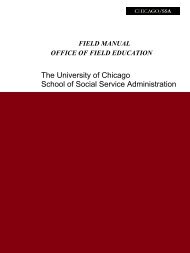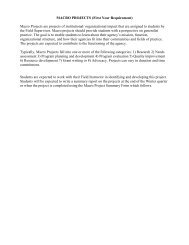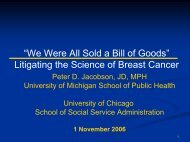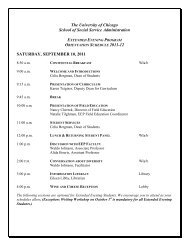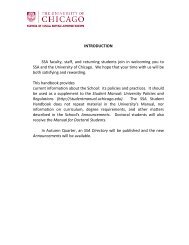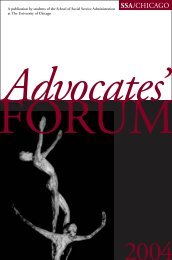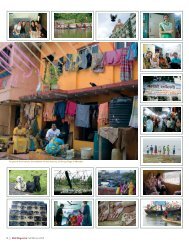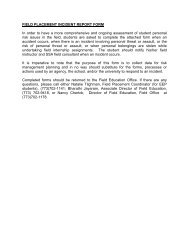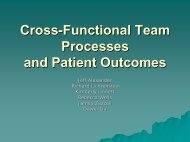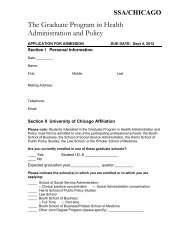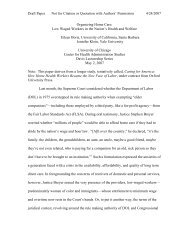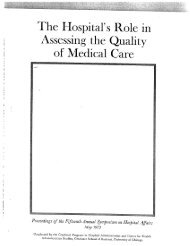DEFINING PROBLEMS. SHAPING SOLUTIONS . - School of Social Service ...
DEFINING PROBLEMS. SHAPING SOLUTIONS . - School of Social Service ...
DEFINING PROBLEMS. SHAPING SOLUTIONS . - School of Social Service ...
Create successful ePaper yourself
Turn your PDF publications into a flip-book with our unique Google optimized e-Paper software.
a d v o c a t e s ’ f o r u m<br />
anthropological study focusing on the flows and futures <strong>of</strong> private adoption<br />
at First Steps and in the greater Chicago area.<br />
The Intimate is Economic<br />
Mentioning money and adoption in the same breath is disquieting. It<br />
raises the specter <strong>of</strong> child trafficking or economic coercion, and recalls<br />
sensationalized adoption scandals that occasionally surface in Western<br />
media. 4 American societal norms tend to dictate that the economic and the<br />
intimate be kept separate, 5 but from an anthropological perspective “it is<br />
perhaps by now a given that most forms <strong>of</strong> kinship are intertwined with<br />
market exchanges <strong>of</strong> various kinds, without necessarily being reducible to<br />
them” (Dorow 2010, 70). Both Kopyt<strong>of</strong>f (1986; 2004) and Zelizer (1985;<br />
2005) have studied the intersection <strong>of</strong> intimacy and monetary exchange and<br />
argue that the intimate and economic realms interact more than we might<br />
like to admit. Kopyt<strong>of</strong>f (2004) contends:<br />
In the modern American and general Western perspective … there is a moral threat<br />
in the commoditization <strong>of</strong> children and, by extension, <strong>of</strong> human reproduction;<br />
the threat lies in the possible invasion <strong>of</strong> the human and sacralized world <strong>of</strong><br />
kinship by economistic principles deemed appropriate only to the world <strong>of</strong><br />
things.(272; emphasis added)<br />
According to Kopyt<strong>of</strong>f (2004), economism (including commoditization)<br />
in kinship relations is “natural” and widespread, the two realms <strong>of</strong>ten<br />
coming into cultural and ideological conflict.<br />
In this context, morality becomes the node at which Western notions<br />
<strong>of</strong> the economic and intimate realms intersect. Private adoption presents an<br />
excellent opportunity to observe and analyze this intersection, for the infant<br />
adoptee in American culture can be imagined as an example <strong>of</strong> a diverted<br />
commodity. Such commodities are “objects placed into a commodity state<br />
though originally specifically protected from it” (Appadurai 1986, 16).<br />
According to Appadurai (1986), “the diversion <strong>of</strong> commodities from their<br />
customary paths always carries a risky and morally ambiguous aura” (27;<br />
emphasis added). Following Appadurai further, we can mark a distinction<br />
between diversion and a process he calls enclaving. While diversion draws<br />
what was protected into the realm <strong>of</strong> commodities, “enclaving seeks to<br />
protect certain things from commoditization” (Appadurai 1986, 26). A<br />
process I will call moral maintenance is an example <strong>of</strong> enclaving in which<br />
certain subjects/objects, such as adopted children, are specifically and<br />
actively protected from being perceived as part <strong>of</strong> a commodity market.<br />
This notion <strong>of</strong> moral maintenance refers to a type <strong>of</strong> discursive and<br />
regulatory labor carried out to defend and protect the intimate realm<br />
against ostensibly immoral economic encroachments.<br />
15



